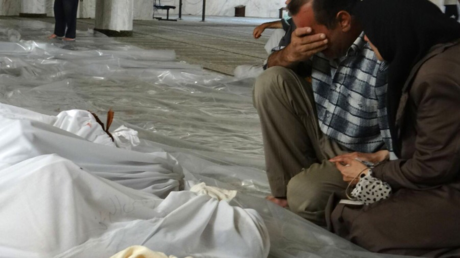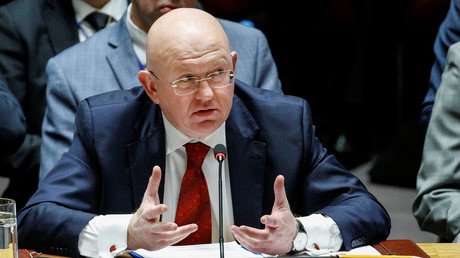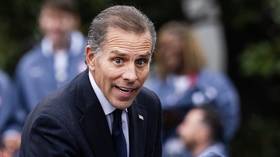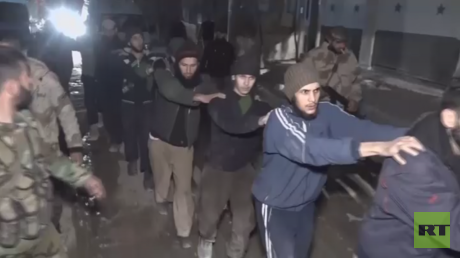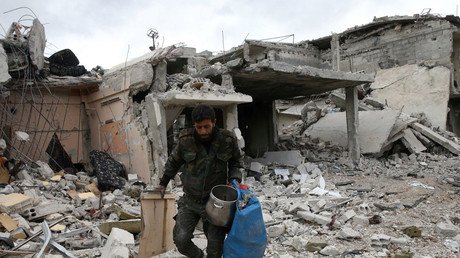Thousands of Jaysh al-Islam militants leave Syria's Douma, release POWs
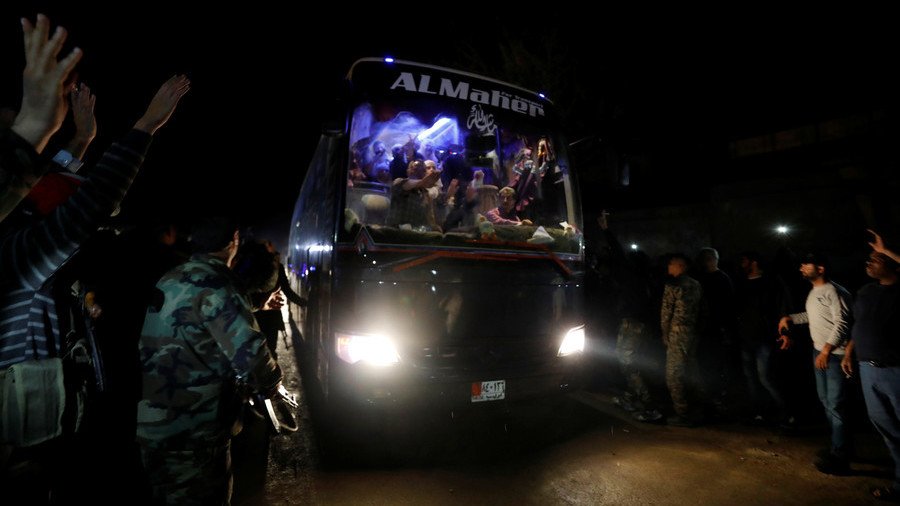
More than 3,000 Jaysh al-Islam militants and their family members have been evacuated from Douma in the Damascus suburb of Eastern Ghouta, as part of Russia-brokered deal which saw the militants' prisoners being released.
The Russian Defense Ministry has been broadcasting live footage from the Muhayam al-Wafideen checkpoint in Eastern Ghouta on Monday, where the mass withdrawal of militants from the town of Douma is currently underway. Dozens of buses with militants and their family members have already headed out for the northern part of Syria's Aleppo Province.
The relocation of militants began late on Sunday, with “3005 fighters and their family members withdrawing by now,” the Reconciliation Center said. Up to 8,000 fighters and around 40,000 of their family members are expected to be relocated from Douma, the Russian military said earlier.
The first group of people being held captive by Jaysh al-Islam were released late on Sunday. "Fifty-six people, including 36 men, 16 women and four children were set free. The work to liberate other hostages is ongoing," the Reconciliation Center said.
The Syrian Army said it gained control of the most of Eastern Ghouta on March 31, lifting the militants’ blockade of a major highway between Damascus and the rest of the country. Since late February, over 157,000 people have been evacuated from Eastern Ghouta and as many as 33,345 from Douma, Russia's Ministry of Defense said in a statement on Thursday.
Syrian troops launched their major push on Eastern Ghouta in February, aiming to end the militants’ occupation that has been in place since 2012. Daily humanitarian pauses in the area began on February 27 as part of efforts by the Syrian Arab Army and Russia to help civilians leave the combat zone. The Russian military repeatedly said that the militants were using civilians as human shields, targeting those attempting to flee the terrorist enclave.
On Saturday, rebel-linked activists, including the so-called “civil defense” group White Helmets, accused the Syrian government of carrying out a chemical attack that allegedly affected dozens of civilians in Douma. Damascus rejected these claims as “fabrications.”
The Russian military said Monday that a group of expert inspected the sites in Douma where the attack supposedly took place and found no trace of chemical weapons use. Medics also looked for hospital patients with signs of chemical poisoning and found none.
“All the accusations brought by the White Helmets, as well as their photos… allegedly showing the victims of the chemical attack, are nothing more than a yet another piece of fake news and an attempt to disrupt the ceasefire,” the Reconciliation Center said.
Moscow has earlier stressed that any military interference in Syria conducted under “far-fetched or fabricated pretexts” would be “absolutely unacceptable” and could trigger “dire consequences.”
Russia's Defense Ministry said last month that US instructors have been training militants to stage “false flag” chemical attacks in southern Syria. The incidents were said to serve as a pretext for airstrikes on Syrian government troops and infrastructure.
"We have reliable information at our disposal that US instructors have trained a number of militant groups in the vicinity of the town of At-Tanf, to stage provocations involving chemical warfare agents in southern Syria,” Russian General Staff spokesman General Sergey Rudskoy said at a news briefing in mid-March. The general added that in march the “saboteur groups” were deployed to the southern de-escalation zone to the city of Deraa, where the units of the so-called Free Syrian Army are stationed.
“They are preparing a series of chemical munitions explosions. This fact will be used to blame the government forces.”
